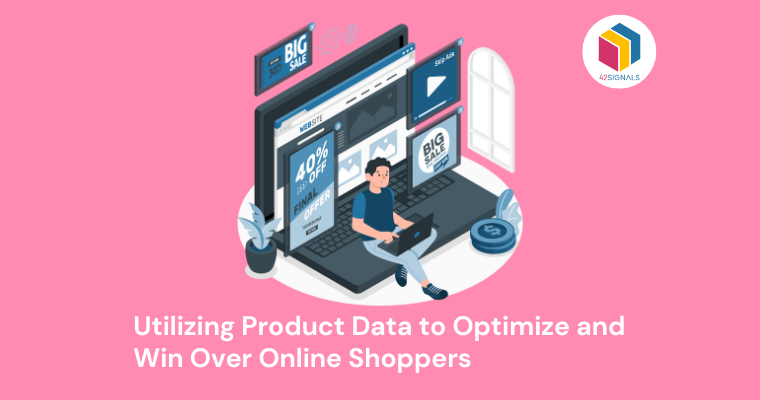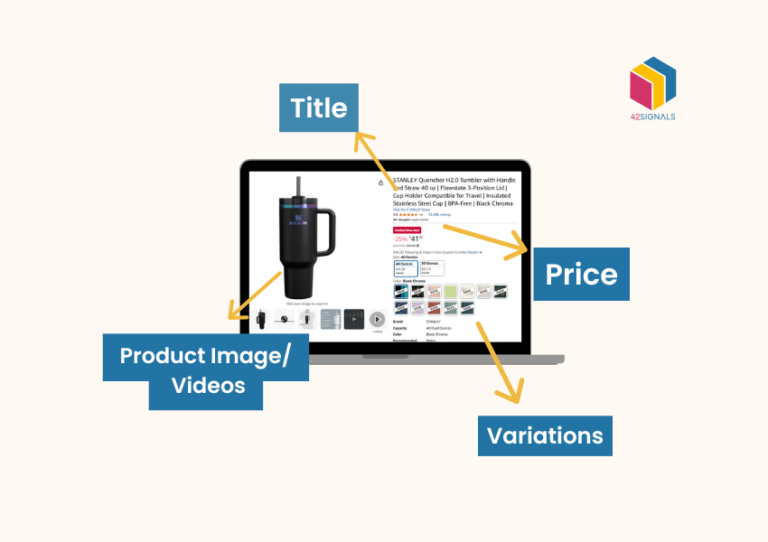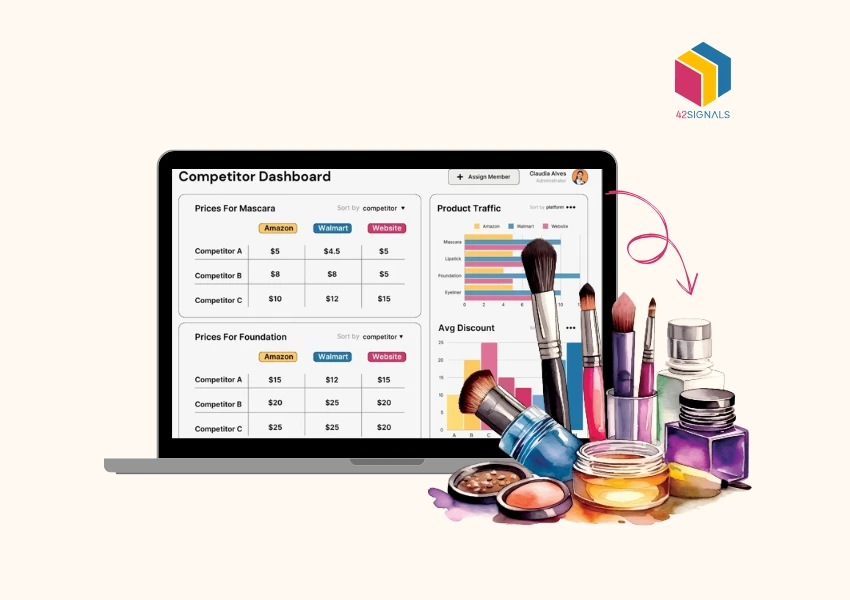Imagine a product listing as a salesperson for your online store. Great product data is like giving that salesperson all the information they need to answer customer questions and convince them to buy.
It includes things like titles, descriptions, pictures, and sizes. By keeping this info accurate and up-to-date, you can help customers find what they’re looking for and boost your sales!
Optimizing product data is essential for e-commerce companies looking to boost their online visibility and drive sales. This process entails tactfully enhancing product information so that it is precise, detailed, and attractive to prospective buyers. Key elements include:
- Data Accuracy: Ensuring all product specifications, images, and pricing are correct.
- Search Relevance: Using keywords and attributes that improve search engine and on-site search visibility.
- Content Quality: Crafting detailed, persuasive product descriptions and high-quality images.
- User Experience: Providing a seamless, informative product viewing experience for users.
- Mobile Optimization: Tailoring product data to be mobile-user friendly, recognizing the increasing use of mobile devices for shopping.
E-commerce platforms must continuously refine these aspects to outperform competitors and meet consumer expectations.
Key Principles of Effective Product Data Management
To ensure product data optimization for e-commerce success, several principles must be adhered to:
- Consistency: Maintain absolute uniformity in product data (titles, descriptions, specs, images, pricing) across all channels (marketplaces, DTC site, social commerce, retailer sites).
- Why it matters: Inconsistency confuses customers, erodes brand credibility, hinders cross-channel shopping journeys, and damages SEO as search engines struggle to identify the canonical product.
- Action: Implement a centralized Product Information Management (PIM) system as the single source of truth.
- Accuracy: Ensure every product detail is factually correct and current – from dimensions, weight, and materials to compatibility, ingredients, and technical specifications.
- Why it matters: Inaccurate data leads to costly returns (size/color/fit errors), negative reviews (“product doesn’t match description”), lost trust, potential legal issues (e.g., safety claims), and supply chain inefficiencies.
- Action: Establish rigorous data validation processes and regular audits; empower customer service to flag inaccuracies.
- Completeness: Provide all information a customer needs to make a confident purchase decision, and a search engine needs to properly index the product.
- Why it matters: Incomplete listings frustrate customers (leading to cart abandonment), increase support queries, hurt conversion rates, and limit visibility in search results (missing attributes).
- Action: Define mandatory data fields per category (beyond basics: include key features, care instructions, sustainability info, usage scenarios, FAQs). Leverage enhanced content (A+ Content/Rich Media).
- Accessibility: Make product data easily discoverable, understandable, and usable both internally (sales, marketing, support, logistics) and externally (customers, search engines, partner systems).
- Why it matters: Internal teams need quick access for tasks (fulfillment needs weights/dimensions; marketing needs specs). Customers need clear, scannable information. Machines (search engines, APIs) require structured data.
- Action: Use clear language, logical organization, bullet points, schema.org markup, and ensure internal systems are integrated.
- Security: Protect product data integrity from unauthorized access, corruption, or theft throughout its lifecycle.
- Why it matters: Data breaches damage reputation and incur legal/financial penalties. Unauthorized changes can sabotage listings or pricing. Protecting sensitive pre-launch data is crucial.
- Action: Implement strict access controls, encryption (at rest & in transit), audit logs, vulnerability management, and secure API practices. Comply with relevant data privacy regulations.
- Scalability: Design data structures, processes, and systems to handle exponential growth in SKU count, attribute complexity, channel expansion, and data volume without degradation in quality or performance.
- Why it matters: Manual processes collapse under scale. Inflexible systems become bottlenecks, hindering new product launches and market expansion.
- Action: Invest in scalable PIM/MDM solutions, automate data ingestion and enrichment, design flexible data models, and plan for future channel requirements.
- Standardization: Adhere to industry-recognized data formats, taxonomies, and attribute definitions (e.g., GTIN, ETIM, GS1, schema.org, marketplace-specific schemas).
- Why it matters: Standardization enables seamless data exchange with retailers, marketplaces, and partners; improves search relevance; facilitates system integrations; and simplifies global expansion.
- Action: Map internal attributes to industry standards; utilize standardized identifiers (UPC/EAN); follow channel-specific data requirements meticulously.
- Flexibility: Build processes and systems capable of efficiently accommodating frequent changes – new product variants, updated regulations (e.g., ingredient disclosures), seasonal promotions, channel-specific requirements, and evolving consumer information needs.
- Why it matters: E-commerce is dynamic. Rigid systems slow down time-to-market for new products/updates and prevent adapting to new opportunities or regulations.
- Action: Use modular content creation, variable data templates, and PIM systems with robust workflow management for rapid updates and approvals.
Leveraging SEO for Product Descriptions

Image Source:Semrush
SEO (Search Engine Optimization) is critical for enhancing product visibility online. To leverage SEO:
- Strategic Keyword Research (Beyond Basics):
- Go Deeper: Use tools like SEMrush, Ahrefs, Moz Keyword Explorer, or MerchantWords alongside Google Keyword Planner. Analyze competitor product pages to see what ranks.
- Understand Intent: Categorize keywords by intent: Navigational (brand/product names), Informational (“how to choose X”), Commercial Investigation (“best X 2024”, “X vs Y reviews”), and Transactional (“buy X online”, “X price”). Target transactional & commercial investigation keywords for products.
- Prioritize Long-Tail: Focus on specific, lower-competition phrases (e.g., “women’s waterproof hiking boots size 7” instead of just “hiking boots”). These often convert better.
- Leverage Data: Analyze your site search data and customer service queries for natural language keywords.
- Primary Keyword Optimization:
- Title Tag is King: Place the primary keyword as close to the beginning as possible in the unique, compelling
<title>tag (ideally under 60 characters). Include essential modifiers (brand, key attribute – e.g., “Organic Cotton T-Shirt – Men’s Crew Neck – [Brand]”). - Natural Integration in Description: Weave the primary keyword naturally into the first 100 words of the product description and 2-3 times throughout, ensuring readability for humans first. Avoid keyword stuffing.
- URL Structure: Include the primary keyword in a clean, readable URL slug (e.g.,
/product/organic-cotton-tshirt-mens-crew).
- Title Tag is King: Place the primary keyword as close to the beginning as possible in the unique, compelling
- Secondary Keyword & Semantic Enrichment:
- Supporting Cast: Use secondary keywords (synonyms, related features, use cases) in your product data naturally within bullet points, feature lists, and descriptive paragraphs.
- Answer Questions: Structure content to answer common customer questions revealed in keyword research (use FAQ sections or integrate answers naturally).
- Semantic Context: Include words related to the product’s category, benefits, problems it solves, and materials. Search engines understand context.
- Image & Multimedia Optimization:
- Descriptive Alt Text: Write concise, keyword-rich alt text for every image, accurately describing the product and the specific view (e.g., “Acme Pro Headphones – Black – Side View” or “Blue Widget Kit components laid out”). Crucial for accessibility and image search.
- File Optimization: Use descriptive filenames (e.g.,
acme-pro-headphones-black-side-view.jpg), compress images (tools like TinyPNG) for fast loading, and use next-gen formats (WebP) where possible. - Unique Visuals: Prioritize high-quality, original photos/videos over generic stock imagery.
- Content Structure & Readability:
- Hierarchical Headers: Use
<H1>for the product title,<H2>/<H3>for major sections (Key Features, Specifications, Benefits, Care Instructions, FAQs). Include relevant keywords naturally. - Scannable Formatting: Utilize bullet points, short paragraphs, bold text for key features, and ample white space.
- Enhanced Content: Leverage platform-specific enhanced content (Amazon A+/Brand Story, Walmart Enhanced Content, Shopify HTML sections) for richer, more engaging descriptions with multimedia.
- Hierarchical Headers: Use
- Compelling Meta Descriptions:
- Persuasive Snippet: Write unique, benefit-driven meta descriptions (around 155-160 characters) for each product, incorporating the primary keyword. Think of it as ad copy for the SERP.
- Call to Action (CTA): Encourage clicks (e.g., “Shop Now”, “Learn More”, “Discover the Difference”).
- Unique Selling Proposition (USP): Highlight a key benefit or differentiator.
- Content Freshness & Evolution:
- Regular Reviews: Schedule periodic audits of product data page performance (traffic, rankings, conversions). Update descriptions based on new features, customer feedback, or changing trends.
- Trend Integration: Monitor trending keywords (Google Trends, tool alerts) and subtly incorporate relevant ones if they align with the product.
- User-Generated Content (UGC): Encourage and showcase reviews. Fresh review content signals activity and provides natural keyword variation.
- Technical SEO Foundation (Critical for E-commerce):
- Page Speed: Optimize images, leverage browser caching, minimize code. Use tools like Google PageSpeed Insights or Lighthouse. Speed is a direct ranking factor.
- Mobile-First: Ensure flawless responsiveness and fast loading on mobile devices.
- Schema Markup: Implement structured data (Product Schema) to provide search engines with explicit product details (price, availability, reviews, SKU). Enables rich snippets in results.
- Canonical Tags: Use correctly to avoid duplicate content issues (e.g., for products in multiple categories or with parameters in URLs).
- Internal Linking: Link strategically to related products, categories, and informative blog content from product pages.
- Off-Page Signals (Indirect but Vital):
- Earned Backlinks: Acquire high-quality links from relevant websites (reviews, influencers, industry resources). Builds authority.
- Local SEO (if applicable): Optimize for local search if you have physical stores or local delivery.
Utilizing High-Quality Images and Videos

Image Source:Smart Insights
In e-commerce, visual appeal directly influences consumer decisions. High-resolution images and videos showcase products more effectively, conveying texture, color, and detail vividly. Multiple angles and zoom-in features assist in simulating a tactile in-store experience online. Quality visuals increase perceived value and reduce return rates by ensuring customers’ expectations are met. Additionally, incorporating instructional or demonstration videos enriches the user experience, fostering confidence in purchase decisions and enhancing brand credibility. To optimize product data:
- Invest in professional photography.
- Integrate 360-degree images.
- Embed product demonstration videos.
- Enable image zoom and high-definition options.
- Ensure fast-loading of images to maintain website performance.
Enhancing User Experience with Detailed Product Information

Image Source: Feed Visor
E-commerce businesses can enhance the buying certainty of online customers through thorough product data. This includes providing exhaustive product descriptions, and clear and professional image representations, as well as soliciting and showcasing customer feedback. These elements collectively enable consumers to make educated purchasing choices, ultimately fostering a positive shopping experience.
Using bullet points, videos, and comparison charts enhances readability and engagement. Furthermore, including FAQs addresses common concerns, boosting customer satisfaction and reducing returns. Thorough details also improve SEO, driving more traffic and elevating the customer experience.
Monitoring and Analyzing Product Data for Continuous Improvement
In e-commerce, constant vigilance over product data generates actionable insights. Retailers track metrics such as click-through rates, conversion rates, and sales volumes to discern patterns and preferences. Effective analysis also involves:
- Monitoring customer feedback for quality and satisfaction indicators.
- Evaluating return rates to identify potential issues with product descriptions or quality.
- Tracking inventory levels to streamline supply chain management and reduce stockouts.
- Comparing pricing and performance against competitors to maintain market relevance.
Through in-depth analysis, businesses can fine-tune their strategies, ensuring products meet market demands and customer expectations, thus driving continuous improvement.
Conclusion
Optimizing product data is a crucial step for e-commerce success. Transform your digital presence and ensure your products stand out in the crowded online marketplace with Digital Shelf Analytics by 42Signals. Drive your decision-making process with actionable insights to:
- Enhance the visibility and searchability of your products
- Tailor your strategies based on consumer behavior metrics
- Stay ahead of the competition with real-time analytics
Step into a future of strategic growth and optimization.







